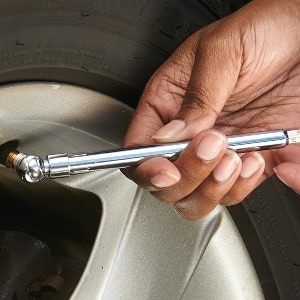TIRE CARE & MAINTENANCE
What is the Benefit to Using Nitrogen When Filling Your Tires?
 Nitrogen molecules — compared to molecules of oxygen — are larger and therefore slower to permeate or diffuse through the structure of the tire. Thus, nitrogen loses pressure less quickly than oxygen by a rate of around 40 percent. This means that, in theory, given static ambient air temperatures, and no punctures, valve misfunctions, or other tire and wheel damage, you may not have to fill your nitrogen-filled tire quite as often.
Nitrogen molecules — compared to molecules of oxygen — are larger and therefore slower to permeate or diffuse through the structure of the tire. Thus, nitrogen loses pressure less quickly than oxygen by a rate of around 40 percent. This means that, in theory, given static ambient air temperatures, and no punctures, valve misfunctions, or other tire and wheel damage, you may not have to fill your nitrogen-filled tire quite as often.
As underinflated tires can also cause decreased fuel economy, you may see claims that nitrogen will give your car improved fuel efficiency. This claim is tied to the potential of more consistent pressures offered by use of nitrogen for inflation in your tires. An underinflated tire may provide decreased fuel economy. This effect can be mitigated with regular and frequent pressure checks, whether using air or nitrogen for your inflation.
No matter what your tires are filled with, you still should be frequently checking your tire pressure. Goodyear recommends you check your tire pressure at least once a month. Using nitrogen does not eliminate the need to regularly check your tire pressure at least once a month. Using nitrogen does not eliminate the need to regularly check your tire pressure.
Some tire shops feel that nitrogen is an important feature to provide to their tire buyers. Besides the cost of acquiring the nitrogen, there is more labor involved in filling tires properly with nitrogen. To remove the regular air from a tire and fill it with nitrogen requires a “purging” process where the tire is repeatedly filled with nitrogen to gradually remove as much of the regular air out of the tire as possible.